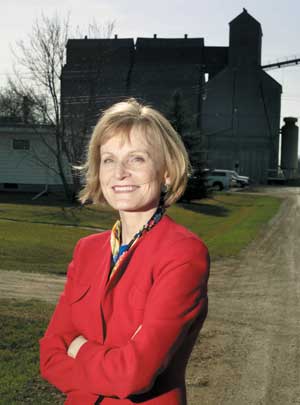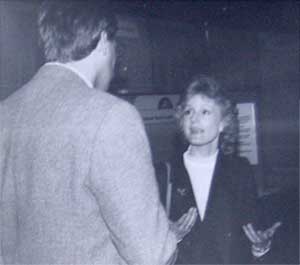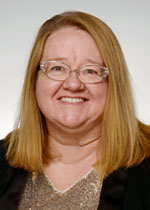Former CRH Leader Officially a Living Legend
By Brenda Haugen on

Mary Wakefield was named a 2019 American Academy of Nursing Living Legend, but the recognition comes as no surprise to those who worked with her back in the days when she was director of the Center for Rural Health (CRH) at the University of North Dakota (UND) School of Medicine & Health Sciences.
"It's a nice award from the profession that I have never left behind and that has always informed my work no matter what I've done since I acquired that nursing degree back in 1976," Wakefield said. "Nursing has always been central to the work I've done, and it's informed the view that I've brought both when I was here at the Center for Rural Health and the view that I brought to my work working in Washington, D.C., really everywhere. That view is always about starting with the patient first."
It's a nice award from the profession that I have never left behind and that has always informed my work no matter what I've done since I acquired that nursing degree back in 1976.
In earning the award, Wakefield was recognized as a trailblazer and advocate who "has produced tremendous impact on health policy through her role in several high-profile positions within the federal government."
"The leaders selected in this year's class of Living Legends are highly-acclaimed, long-time Fellows whose accomplishments to health and wellness are profound and sustained," said Academy President Karen Cox. "The academy is delighted to recognize these incredible nurses as Living Legends. Their legacies will be felt and celebrated at the academy as well as by the public for many years to come."
Originally from Devils Lake, North Dakota, Wakefield started her career practicing in medical-surgical and intensive care nursing. She first came to UND in 1979 to take a faculty position at the College of Nursing.
"I was a newly minted master's degree in nursing, probably about 25 years old," Wakefield said. "I'm surprised they hired me at that age, but that was my first entry into the University of North Dakota."
Wakefield earned her bachelor's degree in nursing from the University of Mary in Bismarck, North Dakota, and her master's and eventually her doctoral degree in nursing from the University of Texas at Austin. She also completed the Harvard University School of Government's Program for Senior Managers in Government.
Wakefield served as director of the CRH from 2001 to 2009. During that time, the CRH grew from 16 employees to more than 50, and many new programs were born, including:
- Rural Assistance Center – now named the Rural Health Information Hub (RHIhub), 2002
- Small Hospital Improvement Program, 2002
- Critical Access Hospital Quality Network, 2007
- Rural Health Research Gateway, 2007
- Health Workforce Information Center, 2008
- Area Health Education Center, 2008
That presence was already there, but I really wanted to execute on that agenda of being a real resource to the communities and to the healthcare infrastructure.
"The beauty of the Center for Rural Health is that it's located in a university – and particularly in this university – and in a very rural state, so when I came back I was really interested in strengthening ties within the state to rural communities and to rural healthcare infrastructure," Wakefield said. "That presence was already there, but I really wanted to execute on that agenda of being a real resource to the communities and to the healthcare infrastructure."
"We really strengthened our national presence as well, and that was through some key programmatic areas, one of them being, at that time, the Rural Assistance Center, now the Rural Health Information Hub - the same thing, but bigger and better since I left," Wakefield said. "But that was a major foray into really positioning this Center for Rural Health, this university, and this rural state as a go-to place for a rich repository of information that was national and expertise to be used and available to people across the United States, from policymakers in Washington to individuals in Alaska who might be interested in more information about rural policy, new rural research findings, etc."

Conference while a staff member for
Senator Quentin Burdick.
Throughout her career, Wakefield has made a tremendous impact wherever she has gone. For more than eight years, she worked in the U.S. Senate, serving as a legislative assistant and later as chief of staff for North Dakota senators Kent Conrad and Quentin Burdick.
Wakefield was named administrator of the Health Resources & Services Administration (HRSA) in 2009, and during her six-year tenure at HRSA, she led program improvements that included focusing on strengthening the healthcare workforce, expanding access to primary care, and supporting health services to people in rural areas. Appointed by President Barack Obama, Wakefield served as acting deputy secretary of the Department of Health and Human Services from March 2016 through January 2017 and again put particular focus on health programs for rural areas.
But no matter where she goes, Wakefield still makes use of the resources she helped build here in North Dakota.
The Center for Rural Health and RHIhub are both great resources for me.
"I still very much have a hand in a rural health policy through other activities that I engage in and boards that I sit on, serving as a resource to members of Congress and their staffs, not just from North Dakota but from other states as well," she said. "The Center for Rural Health and RHIhub are both great resources for me. I don't hesitate to pick up the phone and call them."


 was a communications specialist at the Center for Rural Health at the University of North Dakota School of Medicine & Health Sciences in Grand Forks.
was a communications specialist at the Center for Rural Health at the University of North Dakota School of Medicine & Health Sciences in Grand Forks.



